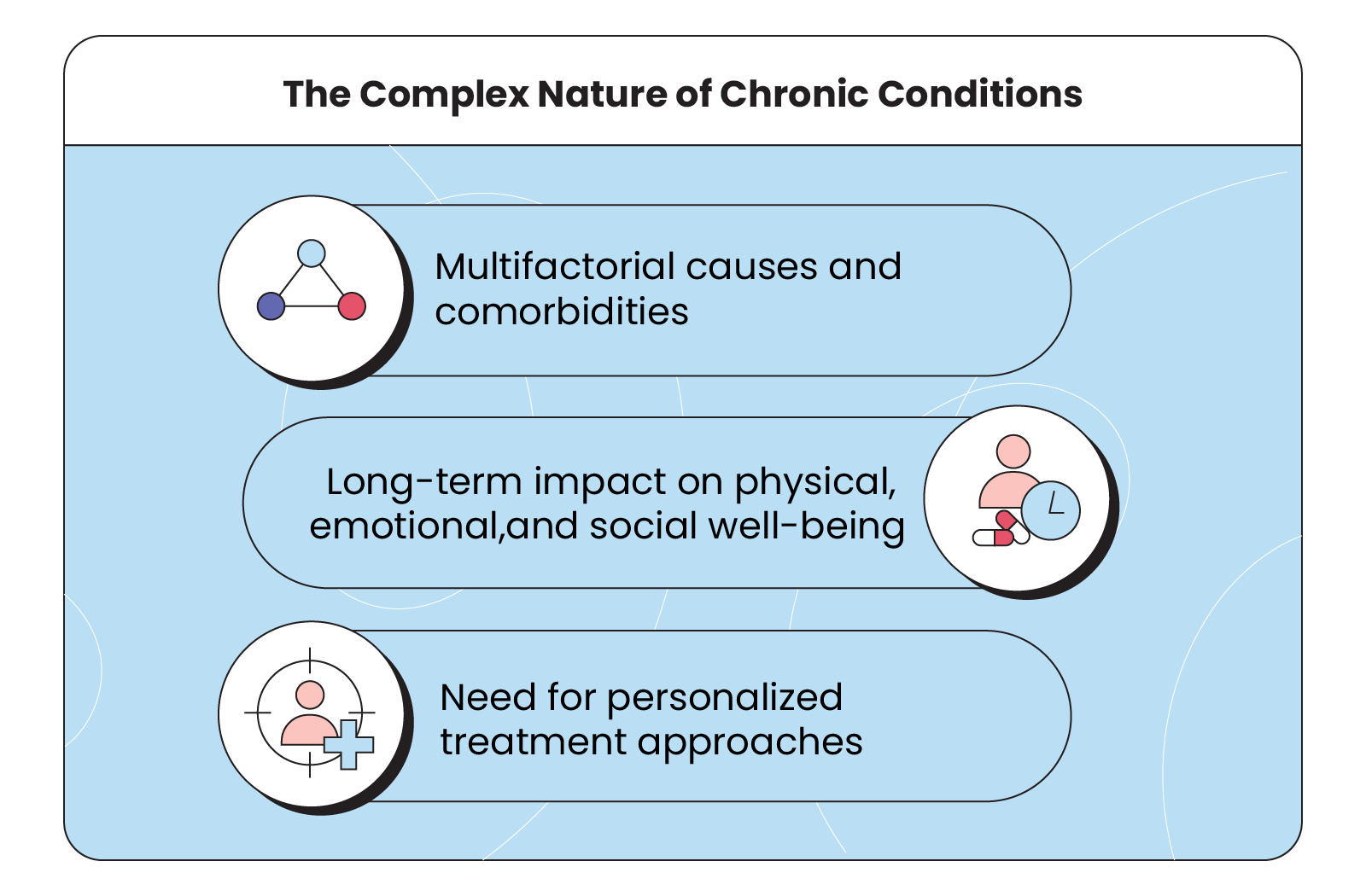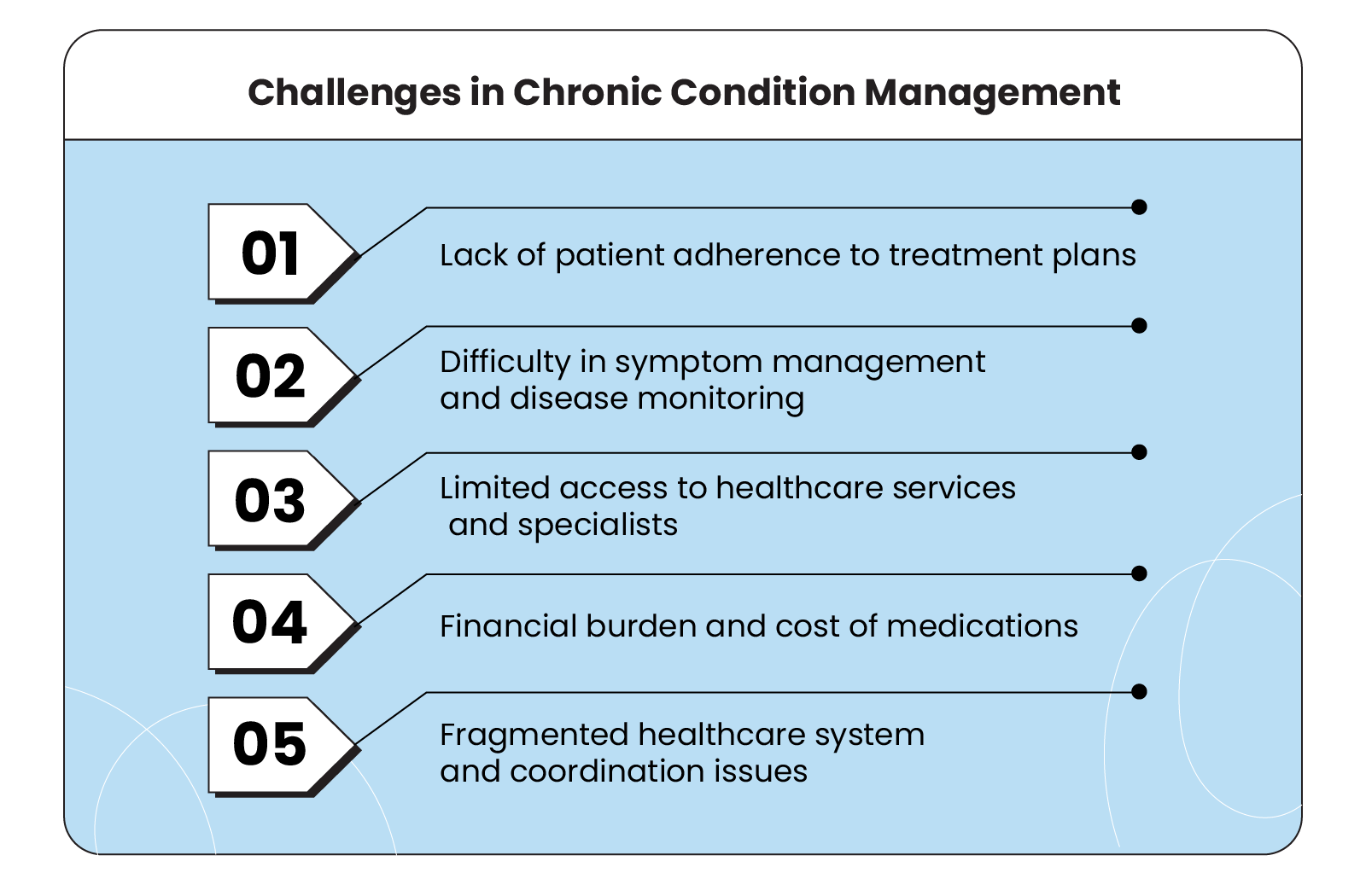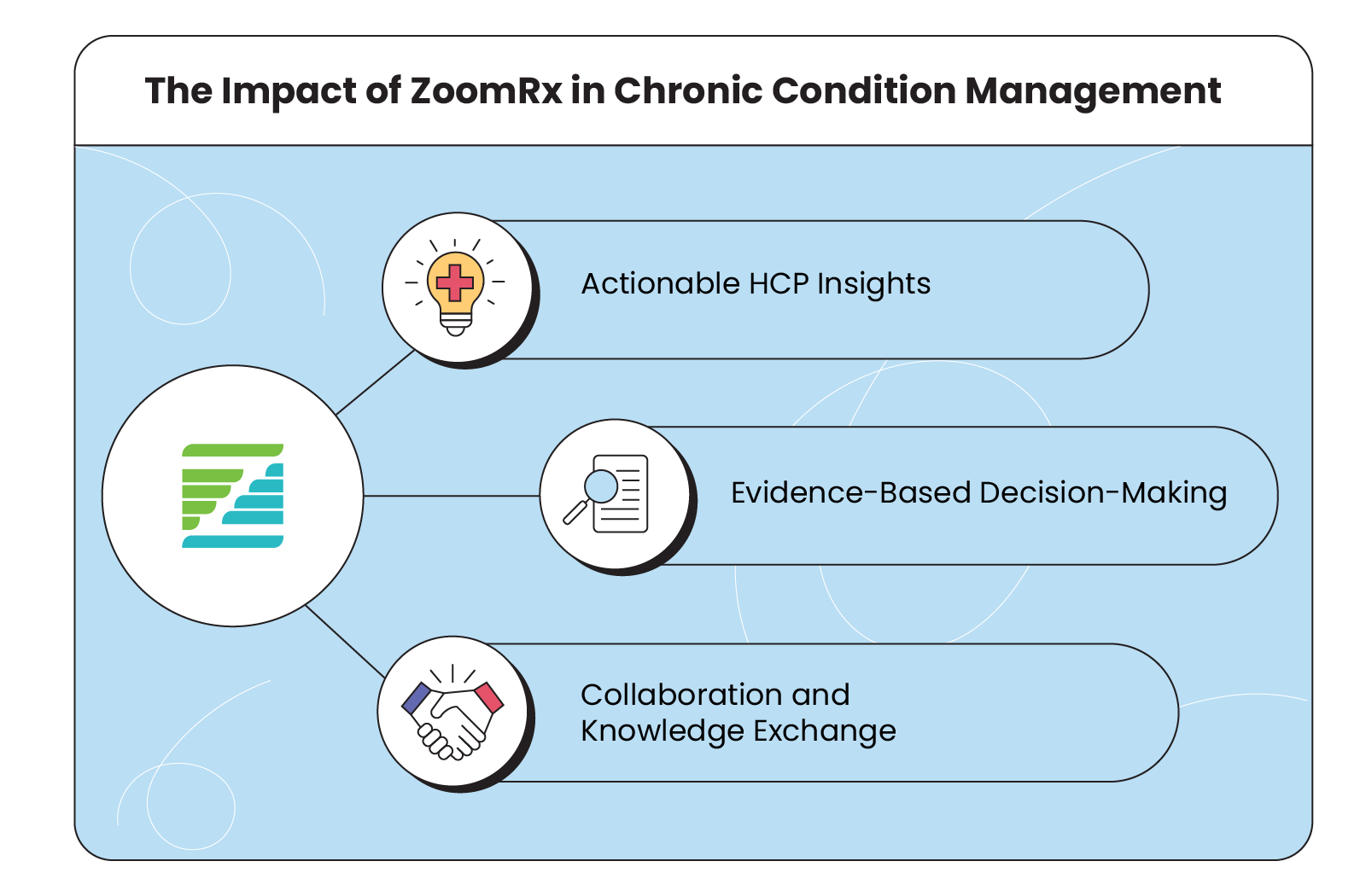Section I: Introduction
Chronic conditions are pervasive health issues that affect a significant portion of the global population. These conditions, such as diabetes, cardiovascular disease, asthma, and arthritis, require ongoing management to ensure optimal health outcomes for individuals and reduce the burden on healthcare systems. However, effectively managing chronic conditions presents numerous challenges that healthcare professionals and patients alike must navigate.
The complexities of chronic conditions lie not only in their multifactorial causes but also in their long-term impact on physical, emotional, and social well-being. Unlike acute illnesses, chronic conditions require continuous monitoring, treatment adjustments, and lifestyle modifications to maintain stability and quality of life. Moreover, the prevalence of comorbidities adds another layer of complexity, as patients may face the challenge of managing multiple conditions simultaneously.In light of these challenges, it becomes imperative to explore innovative approaches that can enhance chronic condition management.
Throughout this blog post, we will delve into the challenges associated with managing chronic conditions and shed light on the invaluable role ZoomRx play in facilitating effective chronic condition management and how ZoomRx leverages its expertise in gathering patient insights, real-world evidence, and market intelligence to support pharmaceutical companies in developing patient-centric strategies and improving outcomes.
Section II: The Complex Nature of Chronic Conditions

Chronic conditions are characterized by their multifaceted nature, presenting unique challenges for individuals and healthcare systems. Understanding the complexity of these conditions is essential to effectively manage them and improve patient outcomes.
Multifactorial causes and comorbidities: Chronic conditions often arise from a combination of genetic predispositions, lifestyle factors, environmental influences, and other underlying health conditions. This intricate interplay of factors makes it challenging to pinpoint precise causes and develop standardized treatment approaches. Additionally, many individuals with chronic conditions often experience comorbidities, meaning they have multiple concurrent health conditions. Managing multiple conditions simultaneously poses additional complexities and requires careful coordination of care.
Long-term impact on physical, emotional, and social well-being: Unlike acute illnesses that have a defined duration, chronic conditions persist over an extended period, sometimes for a lifetime. This prolonged duration can significantly impact a person's physical health, emotional well-being, and social interactions. Individuals with chronic conditions may face limitations in their daily activities, experience fluctuations in symptoms, and grapple with the emotional toll of managing a long-term health condition. Furthermore, chronic conditions can affect relationships, employment opportunities, and overall quality of life.
Need for personalized treatment approaches: Due to the diverse nature of chronic conditions and the variations in individuals' responses to treatments, personalized approaches are crucial. What works for one person may not be as effective for another. Tailoring treatments based on the individual's specific characteristics, such as their genetic profile, medical history, lifestyle, and preferences, is essential for optimizing outcomes. However, achieving this level of personalization requires comprehensive understanding and integration of various data sources, including patient-reported outcomes, clinical data, and real-world evidence.
Addressing the complex nature of chronic conditions necessitates a holistic approach that goes beyond conventional treatment paradigms. By recognizing and adapting to the multifactorial causes, comorbidities, and long-term impact of these conditions, healthcare providers and pharmaceutical companies can better support individuals in their journey toward improved health and well-being.
Section III: Challenges in Chronic Condition Management

Effectively managing chronic conditions poses several challenges that both healthcare providers and patients encounter. By understanding these challenges, we can work towards developing strategies and solutions to overcome them.
Lack of patient adherence to treatment plans: Adherence to treatment plans is vital for managing chronic conditions. However, many individuals struggle to comply with prescribed medications, lifestyle modifications, and self-care routines. Factors such as forgetfulness, financial constraints, complexity of treatment regimens, and lack of motivation can contribute to poor adherence. Addressing these barriers and promoting patient engagement is essential to improve treatment outcomes.
Difficulty in symptom management and disease monitoring: Chronic conditions often involve fluctuating symptoms and disease progression. It can be challenging for individuals to effectively manage symptoms, leading to reduced quality of life and increased healthcare utilization. Continuous monitoring of symptoms, early detection of exacerbations, and timely interventions are necessary to minimize symptom burden and prevent complications.
Limited access to healthcare services and specialists: Accessibility to healthcare services and specialists varies across different regions, which can impact the management of chronic conditions. Individuals in remote areas or underserved communities may face challenges in accessing specialized care, leading to delayed diagnoses, inadequate treatment, and limited support. Bridging these gaps in healthcare access is crucial for ensuring equitable and effective management of chronic conditions.
Financial burden and cost of medications: Chronic conditions often require long-term treatment, including medications, regular check-ups, and diagnostic tests. The financial burden associated with managing chronic conditions can be substantial, particularly for individuals without adequate insurance coverage or limited financial resources. Affordability and access to affordable medications and healthcare services are vital for effective chronic condition management.
Fragmented healthcare system and coordination issues: Chronic condition management often involves multiple healthcare providers, specialists, and care settings. However, the lack of coordination and communication between different providers can lead to fragmented care, disjointed treatment plans, and gaps in information sharing. Coordinated care, care management programs, and health information exchange systems can help overcome these challenges and ensure seamless care transitions.
Recognizing and addressing these challenges is crucial for improving the management of chronic conditions. By implementing patient-centered approaches, leveraging technology and data-driven solutions, and fostering collaboration among healthcare providers, pharmaceutical companies, and policymakers, we can enhance the overall care and outcomes for individuals living with chronic conditions.
Section IV: The Impact of ZoomRx in Chronic Condition Management

ZoomRx plays a vital role in chronic condition management by providing pharmaceutical companies with invaluable insights and resources. The impact of ZoomRx in this domain can be observed through the following key contributions:
Actionable HCP Insights: ZoomRx specializes in gathering comprehensive insights from healthcare professionals (HCPs) involved in chronic condition management. By understanding the perspectives, treatment practices, and challenges faced by HCPs, ZoomRx equips pharmaceutical companies with actionable information. These insights enable pharmaceutical companies to develop tailored strategies and initiatives that better address the needs and preferences of HCPs, ultimately enhancing patient care.
Evidence-Based Decision-Making: Through primary market research, ZoomRx collects and analyzes data from HCPs, enabling evidence-based decision-making. Pharmaceutical companies can leverage this data to gain insights into treatment outcomes, best practices, and emerging trends in chronic condition management. The evidence-based approach supported by ZoomRx facilitates informed decision-making when developing new therapies, optimizing treatment protocols, and allocating resources effectively.
Collaboration and Knowledge Exchange: ZoomRx fosters collaboration and knowledge exchange among pharmaceutical companies, HCPs, and other stakeholders involved in chronic condition management. By connecting these key players, ZoomRx creates opportunities for sharing best practices, discussing emerging trends, and exchanging innovative ideas. This collaboration drives collective efforts towards improving patient outcomes and advancing the quality of care.
By providing actionable HCP insights, supporting evidence-based decision-making, and fostering collaboration, ZoomRx significantly impacts chronic condition management. Pharmaceutical companies benefit from the valuable knowledge and insights provided by ZoomRx, enabling them to develop tailored strategies, improve treatment approaches, and drive innovation in the field.
Conclusion
In conclusion, ZoomRx's expertise, data-driven approach, and commitment to collaboration position it as a valuable partner in chronic condition management. By harnessing the power of HCP insights and market intelligence, ZoomRx is driving positive change and improving outcomes for individuals living with chronic conditions.


